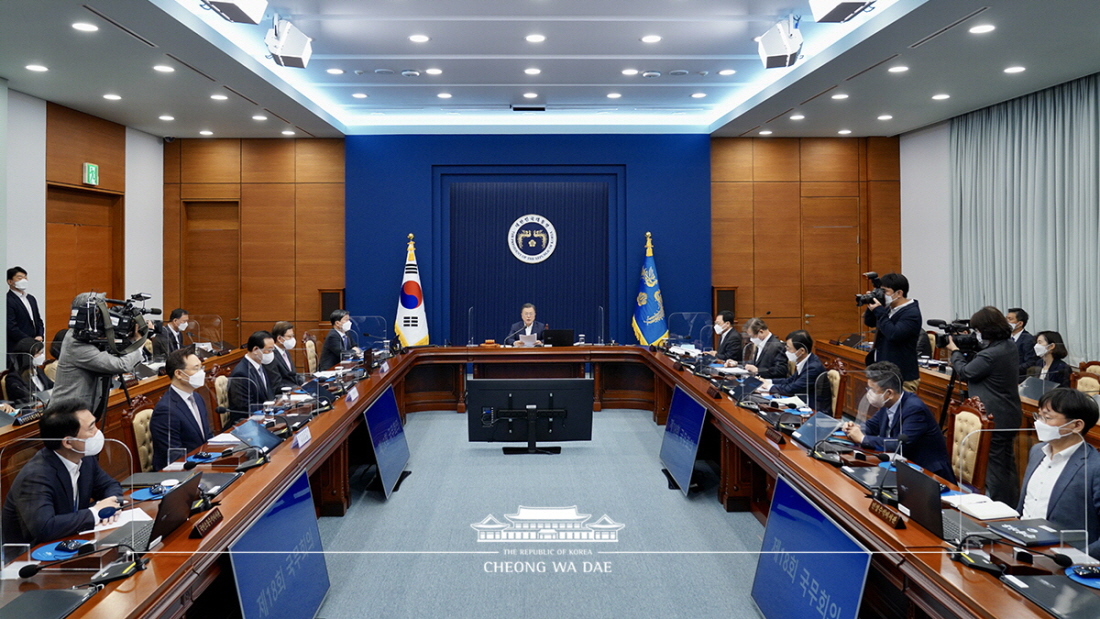이 웹사이트는 제19대 대통령 임기 종료에 따라 대통령기록관이 「대통령기록물 관리에 관한 법률」에 의해 이관받아 서비스하는 대통령기록물입니다. 자료의 열람만 가능하며 수정 · 추가 · 삭제는 불가능합니다.
다만, 「개인정보보호법」에 의하여 개인의 정보를 보호받기 원하시는 분은 관련 내용(요청자, 요청내용, 연락처, 글위치)을 대통령 웹기록물 담당자(044-211-2253)에게 요청해 주시면 신속히 검토하여 조치해 드리겠습니다. 감사합니다.
SPEECHES & REMARKS
BRIEFINGS

Let me begin the 18th Cabinet Meeting.
Finally, social distancing rules have been completely lifted, making it possible for the people to return to normal life. Downgrading COVID-19 to a lower-grade infectious disease will also enable our medical system to return to its pre-pandemic state. I am overwhelmed by the fact that – before my Administration comes to an end – we have been able to return to the normalcy that all of us have long sought. I am wholeheartedly grateful to our people for the cooperation that has made it all possible as well as to the epidemic frontline workers and medical professionals for their dedicated services.
Everyone has been working very hard, indeed. The Government will continue to do all it can until Korea is seen as a pacesetter for the return to normal as well, going beyond a model country in the fight against COVID-19.
It is very gratifying and meaningful to report to the people during today’s Cabinet Meeting about the official launch of the Busan-Ulsan-Gyeongsangnam-do Special Coalition – the Republic of Korea’s first special-purpose local government. The hard work of relevant ministries and agencies as well as the three local governments has come to fruition today. Along with gratitude, I extend heartfelt congratulations on the inauguration of the Special Coalition.
Taking steps to build a Republic of Korea where all regions enjoy balanced, equitable prosperity is the most important national undertaking. The harmful consequences of overcrowding in the Seoul metropolitan area is increasingly serious while local areas are even feared to be dying out. Under these circumstances, balanced national development constitutes a crucial task that will determine the future of our country.
From early on, my Administration has vigorously pushed balanced development policies on various fronts. However, we have yet to reverse the trend of concentration in the Seoul metropolitan area. Sensing the urgent need to change this trend, we have pursued a new balanced development strategy – pan-regional cooperation – in addition to the existing relevant policies. Pan-regional cooperation is about making the Republic of Korea multipolar by creating regional economic-residential zones that are as appealing as the Seoul metropolitan area and that transcend the boundaries of provinces and metropolitan cities as well as counties and districts. This is a bold initiative aimed at promoting mutual benefit between metropolitan Seoul and local areas.
To achieve this goal, we have swiftly laid the legal and institutional foundations to support pan-regional cooperation, and proactive backing has been provided through the Government-wide Pan-regional Cooperation Support Council.
Local governments have also actively engaged in pan-regional cooperation on their own. Notably, Busan, Ulsan and Geyongsangnam-do Province are at the forefront in this regard. After formulating a strategy last February to establish a southeastern megacity, relevant local governments enhanced their communication and cooperation, thereby making this blueprint-like initiative a tangible part of everyday lives.
Finally, the decentralization agreement and the MOU for pan-regional cooperation have been signed today, and the Busan-Ulsan-Gyeongsangnam-do Special Coalition has been launched at last.
Expectations are high that the Special Coalition will promote balanced national development and the region’s advancement. I hope that the area will vigorously move forward toward the goal of leaping into the ranks of the eight leading megacities of Northeast Asia. The region can fully succeed if automobile, shipbuilding, shipping, aviation, hydrogen and other strategic industries are fostered and a common ground for nurturing talented professionals is laid at the same time. This can also happen if – through spatial innovation and enlarged transportation networks like those in the Seoul metro area – we can continue to expand the area where people can go out, conduct their business and return home within a single day.
I hope that local governments and relevant ministries and agencies will work together more closely so that the Busan-Ulsan-Gyeongsangnam-do Special Coalition can take root as a leading model for pan-regional cooperation. I look forward to this new challenge, which was initially taken on by my Administration, advancing further and blossoming under the next one. Moreover, I earnestly wish that the pan-regional cooperation model will spread to Daegu and Gyeongsangbuk-do, Gwangju and Jeollanam-do, the Chungcheong provinces and the rest of the country, becoming a hope-filled key that can open a new era of balanced national development.



